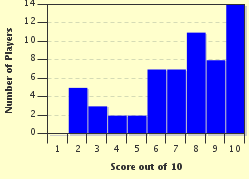Quiz Answer Key and Fun Facts
1. The date and circumstances of the founding of Rome are not exactly known to historians. However, the Romans believed that the founders of the city were Romulus and Remus. The acclaimed Roman scholar Marcus Terentius Varro placed the founding of Rome at CCLIII BC.
2. In the year DIX BC, a major change happened in Roman politics. Which?
3. In CCII BC, the Battle of Zama was fought. It was a decisive victory for the Romans and concluded the Second Punic War. Who were the enemies of Rome at that war?
4. In XLIV BC, Julius Caesar was assassinated. Which of the following was NOT among his murderers?
5. In XXXI BC, the decisive battle of the Final War of the Roman Republic, the one after the assassination of Caesar, commenced. Octavian, later Augustus, defeated Mark Antony and Cleopatra VII, Queen of Egypt. How is the battle known as?
6. Who, in the year AD XXXIII, was sentenced to death by the fifth Roman prefect of Judea?
7. In AD LXIV, a tragedy befell Rome. A great fire consumed large part of the city. Who was the Emperor at that time, who was said to be playing "the fiddle" while the city burned?
8. In AD CXXII, Emperor Hadrian ordered a wall to be erected at the border of one of the most exposed provinces of his Empire in order to protect his subjects from which of the following enemies?
9. In AD CCXCIII, Emperor Diocletian made changes at the governing system of the Roman Empire and replaced the existitng model of government with a new one. How is Diocletian's system called?
10. According to some historians, the days of the Roman Empire ended when Emperor Constantine transferred the capital to Byzantium, which was renamed to Constantinople. When did it happen? (All years are of course AD).
Source: Author
DeepHistory
This quiz was reviewed by FunTrivia editor
bloomsby before going online.
Any errors found in FunTrivia content are routinely corrected through our feedback system.

